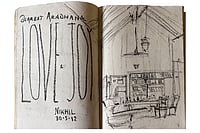“Because all I can think tonight is how deep the sea, and how
vast, how indifferent. How powerless I am to protect you from it.
All I can do is pray. Pray God steers the vessel true, when the
shores slip out of eyeshot and we are a flyspeck in the heaving
waters, keeling and titling, easily swallowed.
Because you, you are precious cargo, Marwan, the most
precious there ever was.
I pray the sea knows this.”
—From Sea Prayer by Khaled Hosseini
It is an imagined letter from a Syrian father to his son before they take the boat to flee to Europe as an ode to Alan Kurdi, the three-year-old Syrian child, who drowned along with many others in the Mediterranean Sea in September 2015.
There have been many boats that have capsized since, many refugees who have drowned in the deep seas. The seas as tombs are without epitaphs. We don’t know their names. We don’t know their stories. We don’t know them.
Last June, two vessels sank in the sea. One was a very, very expensive expedition, which was carrying five billionaires to see the wreckage of a luxury ship called the Titanic in North Atlantic Ocean.
The other was a fishing trawler carrying hundreds of poor people looking to save themselves and live with dignity elsewhere.

A huge search mission in the area off Canada’s Newfoundland province commenced after the submersible called Titan lost communication.
Just four days before Titan went into the sea, the fishing trawler called Adriana carrying hundreds of migrants from Libya to Italy capsized and then sank in the Mediterranean sea on June 14, five days after it had set sail. Around 750 men, women, and children are believed to have been on board. Only 104 were found alive.
These refugees weren’t on an expedition. They boarded the overcrowded boat knowing that the waters are deep and many have drowned before.
They could have been saved.
But the world was glued to the news of the Titan, the possibility of voyeurism it offered. These were people who paid $250,000 to go into a tube that was going to go underwater to see a wreckage from 100 years ago of an “unsinkable ship” called the Titanic, which was claimed to be the most luxurious to set sail ever.
We saw the make of the Titan, the furnishing, etc. We now know about the lives of the five billionaires, their dreams and lifestyles.

We have imagined Titanic, too. Many odes have been paid to that vessel, too. There is the struggle of excess against nature’s obstinacy, the power of adventure, the urge to dominate the sea, to claim the earth and the sky and the sea.
About Adriana, we know nothing. There is just a photo of a trawler with many people on it in the choppy seas. Nameless, faceless. All grouped together as “migrants” and “refugees” and the old question surfaces again—is a human life more valuable or the concept of the sanctity of state borders? Who are these “walls” and “fortresses” protecting us from? From the persecuted?
Thousands of refugees have died since 2014 while attempting to flee the war in Syria.
There is an anti-immigrant hysteria amidst the growth of authoritarianism everywhere. Here and elsewhere. From the war in Vietnam to the one in Ukraine, we have seen multitudes crossing over into other lands leaving everything behind, knowing that they might never return. That’s never an easy choice.
Who is a refugee then? A person who carries the home within and is looked as an outsider in other lands? Or a person who is an outsider within knowing that no place will be home ever?
Homelands exist in memory then. That’s a lot of memory to carry. The weight of it can make any boat sink.
This issue is for the refugees and for us to help us get over what the aid workers call “compassion fatigue”.


























